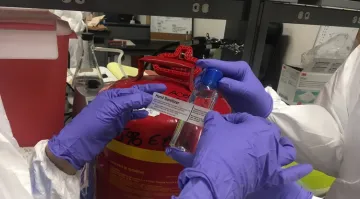Producing Hand Sanitizer for Health Care Workers
Researchers in the College of Agriculture and Life Sciences are producing much-needed hand sanitizer for health care workers in Southern Arizona hospitals.

A group of researchers in the School of Animal and Comparative Biomedical Sciences has turned to making hand sanitizer for health care workers.
“With the goal of keeping our laboratory personnel safe, and also to do our part in ‘flattening the curve,’ we rapidly scaled down our ongoing research projects on bacterial infectious diseases,” says Gayatri Vedantam, a professor in the School of Animal and Comparative Biomedical Sciences and a BIO5 Institute member.
“At the same time, our entire group came to the realization that stepping back was not aligned with what we do as scientists.”
“We decided to focus on the most immediate way we could help with the COVID-19 response. We realized that the hospital workers on the forefront needed things that would keep them safe — masks, gowns and hand sanitizers — more immediately than any kind of research we could do at this moment,” says VK Viswanathan, also an associate professor in the School of Animal and Comparative Biomedical Sciences and a BIO5 Institute member.
Vedantam and Viswanathan study bacteria that cause infections in humans and agriculturally important animals. They’ve done surveillance studies to determine what bacterial pathogens are present in patients in local hospitals and laboratory studies to understand at the molecular level how these organisms cause disease. They’ve also worked to develop diagnostic methods and nonantibiotic medicines for bacterial infections.
Although they have scaled back their own research to meet community needs, Vedantam and Viswanathan’s laboratory personnel enthusiastically jumped in to lend support.
To prepare the hand sanitizer, they followed World Health Organization recommended guidelines, using ingredients available in their respective laboratories. The team took extra precautions to wear protective gear and prepare the product under sterile conditions to mitigate risks for laboratory personnel and to develop end products of the highest quality.
